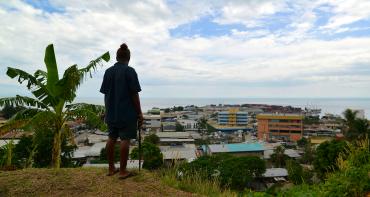Small states in the Commonwealth are ideally placed to benefit from the development of solutions which reduce the devastating impact of natural disasters, according to the Secretary-General Patricia Scotland.

Small states in the Commonwealth are ideally placed to benefit from the development of solutions which reduce the devastating impact of natural disasters, according to the Secretary-General Patricia Scotland.
Speaking at the inaugural Commonwealth Small States Research Conference at the Commonwealth’s headquarters in London, she said the Commonwealth has a collective special responsibility towards small states.
31 of the 39 small states in the world belong to the Commonwealth, and ideas pioneered and tested in a Commonwealth context can usually be applied in similar settings elsewhere.
The Secretary- General was speaking to high commissioners, academics and representatives from multilaterals at the two-day conference under the theme ‘Strengthening Resilience through Disaster Risk reduction’.
The event was designed to explore various ideas such as improving financing mechanisms, harnessing the power of technology, boosting good governance, gender responses and effective policy making.
Conference participants called on the Secretariat to:
- help promote the sharing of data and human resources between countries;
- work with the telecommunications industry and member governments to anonymise cellular data for use in disaster prevention and response;
- assess the adequacy of the UN’s Sendai Framework for reducing disaster risk; and
- promote parametric insurance products, which are less costly and potentially more beneficial for small states because they are governed by specific pre-agreed triggers such as levels of wind speed and rain fall.
In her opening address the Secretary-General added: “In the last three years, I have heard and witnessed the heart-wrenching stories of loss of life, unimaginable infrastructural damage and the utter devastation caused by natural disasters. So, this research conference is certainly not about intellectual stimulation. It is about finding real and effective solutions to the existential threats facing small states.”
Oliver Mahul, global lead and program manager for the World Bank’s Disaster Risk Financing and Insurance Program, delivered the keynote address and spoke about the importance of the research conference in examining effective strategies around issues such as regional risk financing platforms and better targeted financial solutions. He also echoed calls during the meeting for more focus on data and analytical tools.
Prajapati Trivedi, the Commonwealth’s Director of the Economic, Youth, and Sustainable Development, added, “To know what is important we must have a measure. We still do not have an agreed definition of vulnerability. Unless we have a common understanding of the problem, I am afraid we can’t even begin to solve it.”
Reflecting on the contributions of the research conference to the policy dialogue on reducing disaster risks, Professor Trivedi said it will help small states make progress on strategies to bridge policy and technical gaps, better utilise tools such as cellular data and tap into ongoing and potential cutting-edge approaches such as block chain insurance products, censors and satellite technology.
Professor Prajapati added that these outcomes will shape deliberations at the 5th Global Biennial Conference on Small States. This meeting will be held in Apia, Samoa, 25-29 March this year, and will take stock of the challenges facing small states - particularly in relation to preparedness and response to natural disasters.



